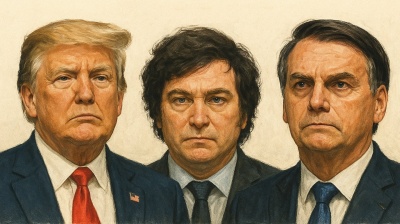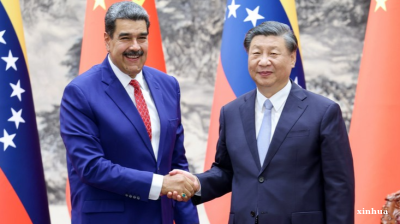Argentines vote on October 26 in midterm legislative elections that will decide whether President Javier Milei can sustain his radical economic overhaul or face paralysis in Congress.
Nearly two years into office, the libertarian leader can point to commendable gains. Inflation has fallen from triple digits to 31.8% annually, while the economy has posted two consecutive quarters of growth for the first time since 2022.
But the adjustment has been brutal, particularly for low-income households, pensioners and welfare recipients. Industrial production contracted 4.4% year on year in August, and poverty rates have risen as subsidies were slashed and public sector hiring frozen. A series of graft allegations against his sister and confidante Karina and a crushing defeat in a Buenos Aires city election have further weakened Milei's position, triggering a sharp sell-off in local assets and pushing the peso to record lows.
The contest will reshape Congress, with 127 lower house seats and 24 Senate seats at stake. Milei's La Libertad Avanza (LLA) right-wing coalition currently holds just 40 deputies and six senators against the Peronist opposition's larger bloc. Victory in Buenos Aires province, a Peronist stronghold where the bulk of seats are concentrated, will prove critical.
Peronism, the leftist populist movement founded by Juan Domingo Perón in the mid-20th century and now led by former president Cristina Kirchner, has dominated Argentine politics for decades through state intervention, generous welfare and union power. That model has arguably undermined stability: large spending commitments, wage indexation and protectionist policies have fuelled chronic deficits and inflation. Institutional weakness has meant social promises lacked fiscal discipline, favouring short-term redistribution over competitiveness and trapping Argentina in cycles of boom, bust and currency crisis.
The Economist Intelligence Unit (EIU) forecasts four scenarios for the upcoming high-stakes election, each with starkly different implications for Argentina's fragile recovery.
The most likely outcome, with a 45% probability, sees LLA winning roughly one-third of the lower house. Political analysts view a third of the national vote as the minimum needed to preserve Milei's ability to block opposition attempts to override his vetoes – a power he has deployed repeatedly in recent months. The EIU expects modest improvement in market confidence, a stronger peso and reviving business investment through 2026-27.
A narrower Peronist victory, deemed 35% likely, would prove far more disruptive. The opposition could reclaim dominance in Buenos Aires province, erasing Milei's legislative leverage and creating gridlock. The EIU warns this could eliminate Argentina's nascent fiscal surplus and trigger contraction next year.
Two tail risks frame these central scenarios. An LLA landslide, just 10 % probable, could enable Milei to accelerate structural reforms including privatisations and much-needed labour market liberalisation. Conversely, an equally unlikely Peronist sweep could reverse fiscal discipline, restore subsidies and derail the IMF-backed programme, reigniting currency depreciation and inflation.
Milei must now square an awkward circle. While his core supporters remain loyal, he must also win over centre-right voters who backed rival parties in 2023 but have since grown disillusioned with austerity and stagnant wages. Pollsters cited by Reuters say turnout among wavering supporters will be decisive.
Meanwhile, financial markets are already pricing in volatility. The peso briefly rallied this week after reports that the US Treasury and Wall Street banks intervened to support the currency. People familiar with the matter told Bloomberg that JPMorgan and Citigroup bought pesos, while traders estimate Washington sold as much as $500mn.
The operation is part of a broader US rescue package. Treasury Secretary Scott Bessent has announced a $20bn swap line for dollar liquidity, plus plans for an equivalent facility to purchase sovereign debt. Bessent called it "a bridge to a better economic future", though analysts warn defending the exchange rate could rapidly drain reserves if pressure persists.
Argentina also enjoys the backing of the IMF, with a $44bn programme renegotiated last April which granted a further $20bn Extended Fund Facility (EFF). Bloomberg estimates Buenos Aires' current exposure to the fund to be around $55bn.
Washington's unprecedented intervention speaks to Milei's geopolitical value as the Trump administration seeks to fend off growing Chinese influence in Latin America. When announcing the $20bn swap line, Bessent hailed Argentina as a "systemic ally of the US". But economists caution that support hinges on policy continuity.
And President Donald Trump himself laid out blunt conditions for continued backing last week, rattling investors with the prospect of a Milei defeat. "We're not going to let somebody get into office and squander the taxpayer money from this country. I'm not going to let it happen," Trump said. "If [Milei] loses, we are not going to be generous with Argentina."
Economy minister Luis Caputo insists the managed-float currency regime agreed with the IMF will not change, reaffirming this week that "the peso bands will remain" despite investor concerns the currency is overvalued. Since April, authorities have allowed the peso to drift within pre-set trading limits: a system traders expect will be loosened regardless of the October 26 outcome. Currency strategists are pricing in a sharper adjustment once the political uncertainty clears.
Yet the peso's weakness may reflect political jitters more than economic fundamentals. Argentina's real effective exchange rate has gained 31% since April and now sits close to its long-term average – hardly the stuff of currency crisis. The country has run consistent trade surpluses under Milei, and its current account remains manageable. Many traders expect the peso to recover once electoral uncertainty lifts, particularly if the president can demonstrate he retains enough support to govern.
That will require moving swiftly. Sunday's result will reveal whether Milei has built the political coalition his reforms need to survive. For now, investors and voters alike are hedging their bets in the only currency they trust: the dollar. Even if that means continuing to stash greenbacks under the mattress.
Marco Cacciati is the regional editor for Latin America at bne Intellinews.



